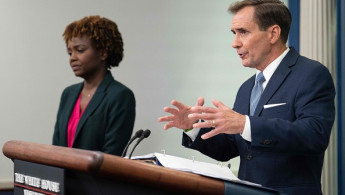Iran criticises US regional air defence plan ahead of Biden's Middle East trip
Iran has described as a "threat" the United States' plans for enhancing air defence cooperation with its Middle East allies, due to be discussed during President Joe Biden's upcoming regional trip.
The White House's National Security Council spokesman John Kirby on Thursday said "greater collaboration" on issues such as air defence, particularly with regards to countering Tehran, would be on Biden's agenda as he visits Israel and Saudi Arabia next week.
"The proposal of this issue is provocative and the Islamic republic of Iran views these remarks as a threat to national and regional security," foreign ministry spokesman Nasser Kanani said late Saturday.
"Trying to create new security concerns in the region will have no result other than weakening common regional security and serving the security interests of the Zionist regime," he continued, in reference to Israel.
Biden is due to begin on Wednesday his first visit to the Middle East since taking office in January 2021. He is set to meet the leaders of Iran's arch-nemesis Israel and its regional rival Saudi Arabia, as well as those of other countries such as Egypt, Iraq and Jordan.
The US and its Gulf Arab allies accuse Iran of destabilising the region with its ballistic missile programme and support for armed militias.
"We're continuing to work on integrated air defence capabilities and frameworks across the region," Kirby said on Thursday.
"The whole region is concerned about Iran and their burgeoning and growing ballistic missile capabilities," he added.
Washington raises such issues "with the sole purpose of Iranophobia and creating discord between the countries of the region", Kanani said.
"Any groundwork for increasing the presence and role of the US in regional security mechanisms will only lead to insecurity, instability and the spread of terrorism," he added.
His remarks came amid heightened tensions between Iran and Western powers as talks in Vienna to revive a 2015 nuclear deal have been stalled since March.
Qatar hosted in late June indirect talks between the US and Iran in Doha in a bid to get the Vienna process back on track, but those discussions broke up after two days without any breakthrough.





 Follow the Middle East's top stories in English at The New Arab on Google News
Follow the Middle East's top stories in English at The New Arab on Google News


